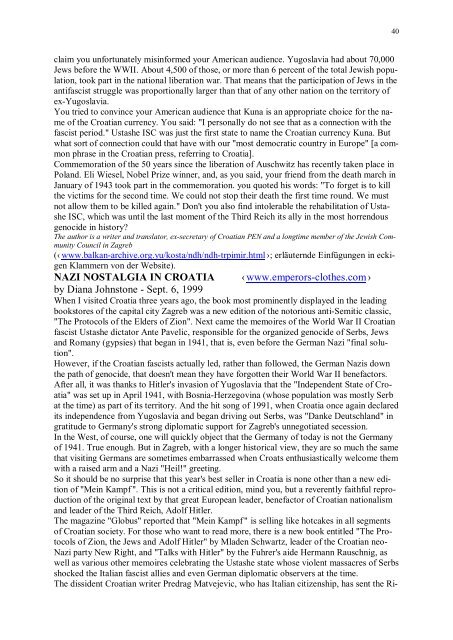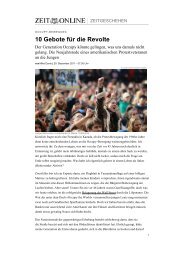JU-I (Amselfeldrede –Izetbegovic –Tudjman) 1. Ich ... - Labournet
JU-I (Amselfeldrede –Izetbegovic –Tudjman) 1. Ich ... - Labournet
JU-I (Amselfeldrede –Izetbegovic –Tudjman) 1. Ich ... - Labournet
Erfolgreiche ePaper selbst erstellen
Machen Sie aus Ihren PDF Publikationen ein blätterbares Flipbook mit unserer einzigartigen Google optimierten e-Paper Software.
claim you unfortunately misinformed your American audience. Yugoslavia had about 70,000<br />
Jews before the WWII. About 4,500 of those, or more than 6 percent of the total Jewish population,<br />
took part in the national liberation war. That means that the participation of Jews in the<br />
antifascist struggle was proportionally larger than that of any other nation on the territory of<br />
ex-Yugoslavia.<br />
You tried to convince your American audience that Kuna is an appropriate choice for the name<br />
of the Croatian currency. You said: "I personally do not see that as a connection with the<br />
fascist period." Ustashe ISC was just the first state to name the Croatian currency Kuna. But<br />
what sort of connection could that have with our "most democratic country in Europe" [a common<br />
phrase in the Croatian press, referring to Croatia].<br />
Commemoration of the 50 years since the liberation of Auschwitz has recently taken place in<br />
Poland. Eli Wiesel, Nobel Prize winner, and, as you said, your friend from the death march in<br />
January of 1943 took part in the commemoration. you quoted his words: "To forget is to kill<br />
the victims for the second time. We could not stop their death the first time round. We must<br />
not allow them to be killed again." Don't you also find intolerable the rehabilitation of Ustashe<br />
ISC, which was until the last moment of the Third Reich its ally in the most horrendous<br />
genocide in history?<br />
The author is a writer and translator, ex-secretary of Croatian PEN and a longtime member of the Jewish Community<br />
Council in Zagreb<br />
(‹www.balkan-archive.org.yu/kosta/ndh/ndh-trpimir.html ›; erläuternde Einfügungen in eckigen<br />
Klammern von der Website).<br />
NAZI NOSTALGIA IN CROATIA ‹www.emperors-clothes.com›<br />
by Diana Johnstone - Sept. 6, 1999<br />
When I visited Croatia three years ago, the book most prominently displayed in the leading<br />
bookstores of the capital city Zagreb was a new edition of the notorious anti-Semitic classic,<br />
"The Protocols of the Elders of Zion". Next came the memoires of the World War II Croatian<br />
fascist Ustashe dictator Ante Pavelic, responsible for the organized genocide of Serbs, Jews<br />
and Romany (gypsies) that began in 1941, that is, even before the German Nazi "final solution".<br />
However, if the Croatian fascists actually led, rather than followed, the German Nazis down<br />
the path of genocide, that doesn't mean they have forgotten their World War II benefactors.<br />
After all, it was thanks to Hitler's invasion of Yugoslavia that the "Independent State of Croatia"<br />
was set up in April 1941, with Bosnia-Herzegovina (whose population was mostly Serb<br />
at the time) as part of its territory. And the hit song of 1991, when Croatia once again declared<br />
its independence from Yugoslavia and began driving out Serbs, was "Danke Deutschland" in<br />
gratitude to Germany's strong diplomatic support for Zagreb's unnegotiated secession.<br />
In the West, of course, one will quickly object that the Germany of today is not the Germany<br />
of 194<strong>1.</strong> True enough. But in Zagreb, with a longer historical view, they are so much the same<br />
that visiting Germans are sometimes embarrassed when Croats enthusiastically welcome them<br />
with a raised arm and a Nazi "Heil!" greeting.<br />
So it should be no surprise that this year's best seller in Croatia is none other than a new edition<br />
of "Mein Kampf ". This is not a critical edition, mind you, but a reverently faithful reproduction<br />
of the original text by that great European leader, benefactor of Croatian nationalism<br />
and leader of the Third Reich, Adolf Hitler.<br />
The magazine "Globus" reported that "Mein Kampf " is selling like hotcakes in all segments<br />
of Croatian society. For those who want to read more, there is a new book entitled "The Protocols<br />
of Zion, the Jews and Adolf Hitler" by Mladen Schwartz, leader of the Croatian neo-<br />
Nazi party New Right, and "Talks with Hitler" by the Fuhrer's aide Hermann Rauschnig, as<br />
well as various other memoires celebrating the Ustashe state whose violent massacres of Serbs<br />
shocked the Italian fascist allies and even German diplomatic observers at the time.<br />
The dissident Croatian writer Predrag Matvejevic, who has Italian citizenship, has sent the Ri-<br />
40



